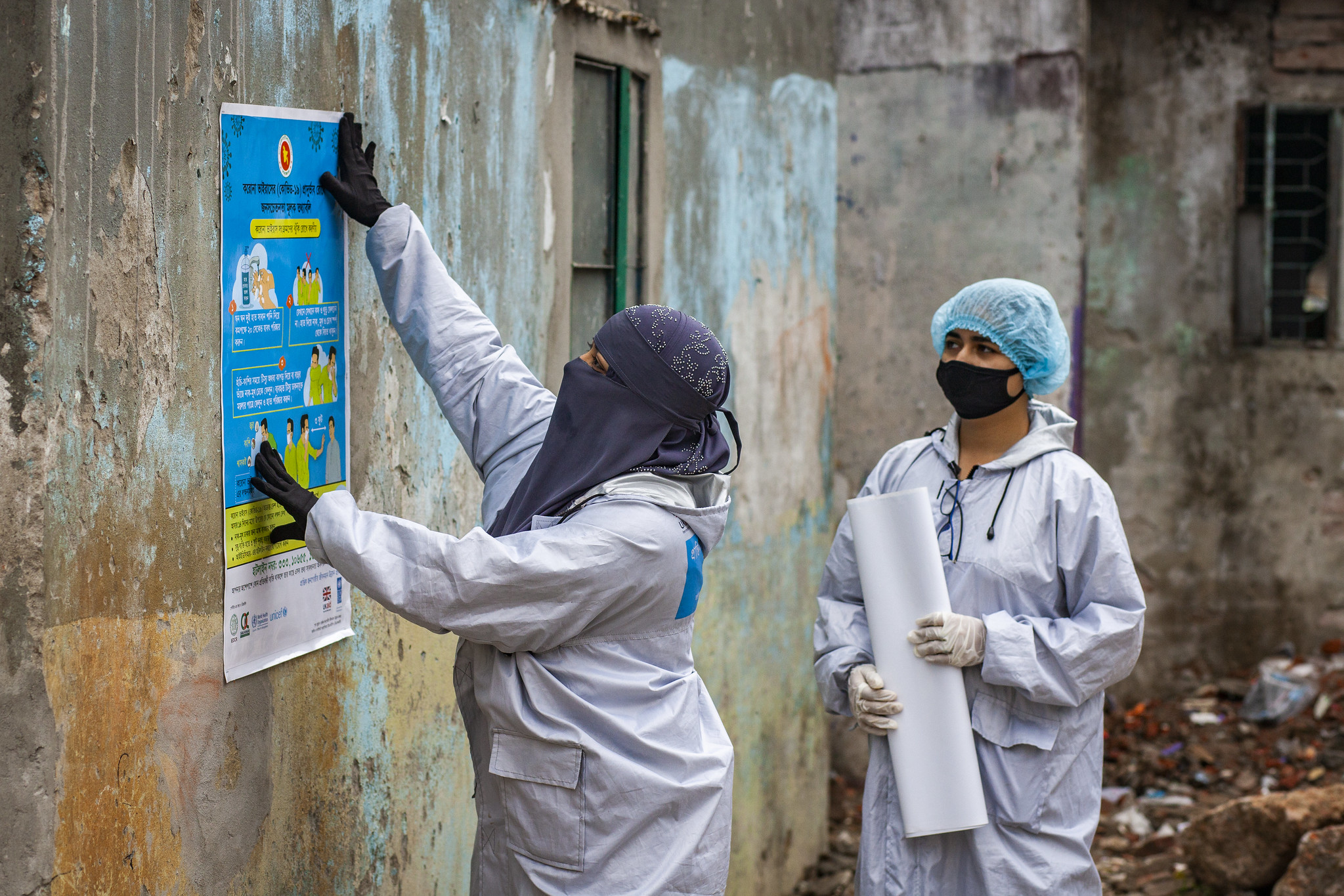I wonder if the quarantine accomplished much in the developing world. In a place like Canada where the government has money to send people monthly checks it makes sense, but in Argentina, Peru, Bolivia, etcetera? The governments don't have the budget to pay every citizen to stay home. Most of the population lives in small homes/apartments with multiple generations living under one roof, they need to take shared transportation, and so on. The average age is much lower in developing countries vs developed countries too. I don't have the answers, but I hope those in charge learn something from this pandemic so that society can handle the next one better.
You are using an out of date browser. It may not display this or other websites correctly.
You should upgrade or use an alternative browser.
You should upgrade or use an alternative browser.
A second quarantine?
- Thread starter iggysnacks
- Start date
The problem is, we've never seen seasonal flu reporting in the past. If we've never seen reports of hospitals under extreme pressure before, it might be because that never happened before, or, it might be because it has often happened before--when health was not "news"--but was never reported.Have you ever seen a seasonal flue to cause this?

ICU availability in Southern California at 0%, and it's going to get worse, officials warn
The number of unoccupied beds in Southern California has steadily dropped as hospitals are flooded by unprecedented numbers of COVID-19 patients.www.latimes.com
In the UK, the press is full of reports about the National Health System under the same kind of pressure. But if we check back over time, we discover that every year at this time the press is full of reports about National Health System under this kind of pressure.
I am simply starting to question what the press are telling us. You refute my argument by quoting to me what the press is reporting.
Renzi
Registered
- Joined
- May 31, 2020
- Messages
- 454
- Likes
- 583
Have you ever seen a seasonal flue to cause this?

ICU availability in Southern California at 0%, and it's going to get worse, officials warn
The number of unoccupied beds in Southern California has steadily dropped as hospitals are flooded by unprecedented numbers of COVID-19 patients.www.latimes.com
The problem is, we've never seen seasonal flu reporting in the past. If we've never seen reports of hospitals under extreme pressure before, it might be because that never happened before, or, it might be because it has often happened before--when health was not "news"--but was never reported.
In the UK, the press is full of reports about the National Health System under the same kind of pressure. But if we check back over time, we discover that every year at this time the press is full of reports about National Health System under this kind of pressure.
I am simply starting to question what the press are telling us. You refute my argument by quoting to me what the press is reporting.
The press is simply reporting publicly available data, they're not creating a fairy tale (or hoax, in Trumpian parlance). If you have a problem with how press spins the data, as most people do, fine. But that doesn't the numbers aren't real.
I generally don't even bother with media coverage and consult various databases directly:

COVID-19 Map - Johns Hopkins Coronavirus Resource Center
Coronavirus COVID-19 Global Cases by the Center for Systems Science and Engineering (CSSE) at Johns Hopkins University (JHU)

COVID-19 Government Response Tracker
Governments are taking a wide range of measures in response to the COVID-19 outbreak. The response tracker tool aims to track and compare policy responses around the world, rigorously and consistently – and make this data freely available.
I generally don't even bother with media coverage and consult various databases directly:
I don't see how this data answers Alby's request for hospitals load data year over year.
Also all data about covid number of cases is death is subject to these kinds of bias:
(1) number of cases tends to be undercounted because they miss asymptomatic or mildly symptomatic cases;
(2) number of deaths tends to be overcounted because of comorbidity.
To count number of cases correctly you need to perform representative antibody tests
and actually some labs conducted such tests and their numbers in California was that number of people affected by covid at some point in past is ~7x times higher than known number of covid cases https://news.uci.edu/2020/10/28/ant...y-7-times-more-prevalent-in-o-c-than-thought/
I am questioning whether we are seeing something this year that we haven't seen in past years. If you have statistics for ICU occupancy in LA in previous years at this time of year, and they don't show similar levels of ICU occupancy, unearth them, post them here, and I will happily concede that, in LA, hospitals are under precedented pressure due to Covid-19. An LATimes article is not, as another poster has pointed out, a reliable source. It spins.
I have an open on the issue. But I am questioning more and more of what we are told.
I have an open on the issue. But I am questioning more and more of what we are told.
antipodean
Registered
- Joined
- Oct 20, 2019
- Messages
- 2,163
- Likes
- 3,320
Excess deaths. That is the only real way to test if COVID is worse than the seasonal flu and regular plagues and other curses upon mankind.
For example, due to COVID precautions including isolation efforts some countries are not reporting excess deaths because not as many people are getting sick with the regular illnesses whereas in other places it simply adds to toll. Over time we will see these stats for sure but I don't expect it to look the same in every country because every country is dealing with it so differently.
Either way in Argentina we can almost be sure that whatever measures they design will be another politically and ego driven charade where mistakes must never ever be admitted.
For example, due to COVID precautions including isolation efforts some countries are not reporting excess deaths because not as many people are getting sick with the regular illnesses whereas in other places it simply adds to toll. Over time we will see these stats for sure but I don't expect it to look the same in every country because every country is dealing with it so differently.
Either way in Argentina we can almost be sure that whatever measures they design will be another politically and ego driven charade where mistakes must never ever be admitted.
Renzi
Registered
- Joined
- May 31, 2020
- Messages
- 454
- Likes
- 583
I don't see how this data answers Alby's request for hospitals load data year over year.
Also all data about covid number of cases is death is subject to these kinds of bias:
(1) number of cases tends to be undercounted because they miss asymptomatic or mildly symptomatic cases;
(2) number of deaths tends to be overcounted because of comorbidity.
To count number of cases correctly you need to perform representative antibody tests
and actually some labs conducted such tests and their numbers in California was that number of people affected by covid at some point in past is ~7x times higher than known number of covid cases https://news.uci.edu/2020/10/28/ant...y-7-times-more-prevalent-in-o-c-than-thought/
Data isn't subject to bias, it's just math. But how you interpret data can be biased and is vulnerable to manipulation, especially by people are not experts (like politicians and You Tube conspiracy theorists). Anybody with r could probably make a scatterplot correlating Covid mortality with shoe size.
To bring the thread back on topic, my fundamental point (which I may have failed to make sufficiently clearly) is that, surely, we can only repeat a measure used in the past if two conditions hold: (i) the result of the measure in the past was successful; (ii) we have the same information as we had in the past. In the case of Argentina, it is very debatable that the first lockdown was successful. But we don't even have to go there. It is sufficient to point out that the second condition doesn't hold--the information has changed, and the situation is not as dire as it was originally thought. The same argument (that this infection is 2-3% deadly, and will spread rapidly among us) no longer applies. Remember too,that the purpose of the lockdown was above all to buy time for the health system (ventilators, trained operators, ICU beds and ICU nurses, testing, contact tracers etc) to prepare. What happened to that? If the government succeeds in locking us down in Argentina again, it will be because we have forgotten how this all started and why we gave them the license we did the first time round.Personal request for this thread to stay on topic and not become yet another 'this is no worse than the flu' thread - there's already *at least* two threads for that
(As a subpoint, I question why, around the world, people seem to have this collective amnesia, that, in places like the UK, causes them to forget how and why lockdowns began, and to then re-license the government to lock them down, when the information they and their governments have is now different. And I question the media's role in our amnesia.)
The argument is not whether coronavirus "is worse than the flu or not". It probably is worse, and time will tell. The argument is: based on what we do already know, is that it is not as bad as we thought it was going to be (as they told us it would be) when we agreed with the government to lock us down. So any government trying to lock down a second time needs to make a new case. It doesn't seem that too many citizens around the world are asking them to. What is the new case in Argentina?
Last edited:
